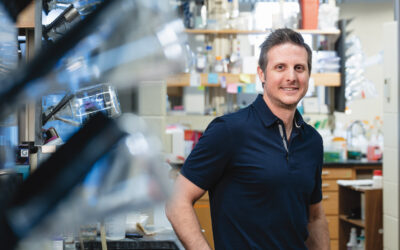
Eric Barker, Val Watts and Michael Kinch (Purdue University graphic)
May 19, 2025
WEST LAFAYETTE, Ind. — Purdue University’s College of Pharmacy is now home to the Center for Research Innovation in Biotechnology and the Clinical Drug Experience Knowledgebase, a comprehensive database of every active pharmaceutical ingredient with evidence of clinical testing.
The center, or CRIB, is a collaborative effort between Purdue and Stony Brook universities. It was founded in 2014 at Washington University in St. Louis by Michael Kinch, a former Purdue faculty member, who is now Stony Brook’s chief innovation officer and CRIB’s director. The center provides transparent information and analyses of drug discovery and development via the knowledgebase, or CDEK.
The data can be used by researchers as they consider additional or alternative uses for current active pharmaceutical ingredients (APIs), said Eric Barker, Purdue University’s vice president for health affairs.
“This center and knowledgebase are unlike anything currently available in terms of open access to comprehensive and accurate API data,” said Barker, who is also Purdue’s Jeannie and Jim Chaney Dean of Pharmacy. “CDEK includes information at the intersection of science, medicine, business and law surrounding pharmaceuticals. We brought CRIB to Purdue to bolster the university’s already robust health sciences resources and expertise to continue advancing health care solutions using artificial intelligence and machine learning.”
As CDEK’s information can contribute to drug development for humans and animals, this center also supports Purdue’s One Health mission, which drives innovation at the intersection of human, animal and plant health.
While curating information from the National Institutes of Health, U.S. Food and Drug Administration and prominent academic sources, the CRIB team found that at least 20% of the data from these sources is too ambiguous for practical use. Beyond correcting these deficiencies, the CDEK dataset provides additional information that other databases don’t, including drug pricing and detailed information about the sponsors and how each medicine works and the intended clinical applications.
CRIB joined Purdue to enhance the College of Pharmacy’s capabilities in aggregating and analyzing innovations in therapeutics and vaccines, said Val Watts, Purdue Pharmacy’s associate dean for research, professor of medicinal chemistry and molecular pharmacology, and CRIB’s project lead for Purdue.
“The partnership enables the center to leverage extensive data to facilitate more informed analysis and decision-making in terms of drug development and therapeutic innovations,” Watts said. “We aim to accelerate research efforts, promote evidence-based practices, and ultimately improve outcomes in the field of pharmaceuticals and vaccines.”
The data captures information reflecting medicines used over the past two centuries with most of the information reflecting medicines approved or tested in the past 50 years.
The extended time frame allows investigators to identify not merely potentially interesting findings, but also see what has changed over time, said Kinch, who formerly served as a professor of cellular pharmacology in the Purdue College of Veterinary Medicine.
“We have learned that the information conveyed via CDEK has powerful scientific and societal implications,” he said. “Using this data, we can predict the likelihood that a drug currently in clinical trials will be approved or even progress to the next stage of clinical development. We can also identify trends in real time as we are constantly updating the database by blending human experience and artificial intelligence.”
Beyond research, some applications for the data include historians interested in price and equity, academics looking for career development, or investors interested in startup companies.
“The data that can inform better decisions is now available,” Kinch said. “Our goal is to increase awareness of the availability of this information. More than 60 peer-reviewed papers and five books have been published because of CDEK, and we’ve only scratched the surface. We may have the data researchers need to answer a variety of interesting questions and to solve difficult problems.”
About Purdue University
Purdue University is a public research university leading with excellence at scale. Ranked among top 10 public universities in the United States, Purdue discovers, disseminates and deploys knowledge with a quality and at a scale second to none. More than 107,000 students study at Purdue across multiple campuses, locations and modalities, including more than 58,000 at our main campus in West Lafayette and Indianapolis. Committed to affordability and accessibility, Purdue’s main campus has frozen tuition 14 years in a row. See how Purdue never stops in the persistent pursuit of the next giant leap — including its comprehensive urban expansion, the Mitch Daniels School of Business, Purdue Computes and the One Health initiative — at https://www.purdue.edu/president/strategic-initiatives.
About Stony Brook University
Stony Brook University is New York’s flagship university and No. 1 public university. It is part of the State University of New York (SUNY) system. With more than 26,000 students, more than 3,000 faculty members, more than 225,000 alumni, a premier academic healthcare system and 18 NCAA Division I athletic programs, Stony Brook is a research-intensive distinguished center of innovation dedicated to addressing the world’s biggest challenges. The university embraces its mission to provide comprehensive undergraduate, graduate and professional education of the highest quality, and is ranked as the #58 overall university and #26 among public universities in the nation by U.S. News & World Report’s Best Colleges listing. Fostering a commitment to academic research and intellectual endeavors, Stony Brook’s membership in the Association of American Universities (AAU) places it among the top 71 research institutions in North America. The university’s distinguished faculty have earned esteemed awards such as the Nobel Prize, Pulitzer Prize, Indianapolis Prize for animal conservation, Abel Prize, Fields Medal and the Breakthrough Prize in Mathematics. Stony Brook has the responsibility of co-managing Brookhaven National Laboratory for the U.S. Department of Energy — one of only eight universities with a role in running a national laboratory. In 2023, Stony Brook was named the anchor institution for The New York Climate Exchange on Governors Island in New York City. Providing economic growth for neighboring communities and the wider geographic region, the university totals an impressive $8.93 billion in increased economic output on Long Island. Follow us on Facebook https://www.facebook.com/stonybrooku/ and X@stonybrooku.
Media contact: Brittany Steff, bsteff@purdue.edu



